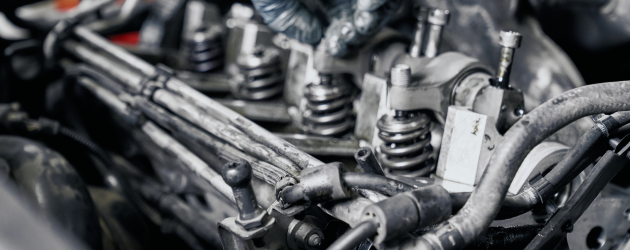Here’s a checklist to consider for helping keep older cars going strong even longer
In 2020, the average age of vehicles on the road in the U.S. rose to 11.9 years, according to IHS Markit. The older the car, the higher the miles, and the more problems that can surface. Luckily, today’s cars are built to last. Most modern vehicles are designed to drive at least 150,000 miles over their lifetime, and some can get double that.
With the proper maintenance and protection, you can keep your high-mileage vehicles running smoothly and reliably for as long as possible.
What is a high-mileage vehicle?
If a car has 75,000 miles or more on it, it’s considered a high-mileage vehicle. High-mileage cars require more frequent maintenance than newer vehicles to keep them on the road and performing at their best. Another thing to keep in mind is that a vehicle can be considered “high mileage” based on age, not just miles. Vehicles reaching the 6-7 year old mark can benefit from the additional protection of Kendall GT-1 Endurance High Mileage even if they still have relatively low miles driven.
Here are the top six maintenance tips you can use to enhance the performance and reliability of your high-mileage vehicles.
1. Change the Oil
It should come as no surprise that this is the first thing we want you to keep in mind. After all, if the engine is the heart of your car, then the oil is its blood. Therefore, the number one thing you can do to keep your high-mileage vehicles performing stronger for longer is to change its oil at the recommended interval and use a motor oil specifically formulated for high-mileage vehicles.
Why choose a high-mileage oil?
Just like any piece of machinery, as engines age, their internal components are subject to increased wear. High-mileage oils contain additives that take care of older engines, like seal compatible conditioners, antioxidants, detergents, and strong anti-wear or anti-friction additives.
Motor oils formulated for high-mileage vehicles have higher film strengths and viscosities that help them stay thick longer to better protect engine parts by eliminating the risk of metal-to-metal contact.
Kendall’s High Mileage Motor Oils are specially formulated with unique additives that may rejuvenate worn engines – this, in turn, may slow down the aging process of high-mileage engines.
Kendall GT-1 Endurance with LiquiTek
Our premium quality, part-synthetic automotive engine oil specially designed to provide excellent engine protection for both turbocharged gasoline direct injection, conventional gasoline-fueled and flex-fueled passenger cars and light trucks under all operating conditions. It also is recommended for use in lower-mileage vehicles, including new cars under warranty. It is part of the Kendall ILSAC GF-6 product line.

2. Oil Supplement
The engine is the heart of the car. To keep it performing strong, give it a boost of protection with an oil supplement made especially for high-mileage cars. Adding an oil supplement to your motor oil helps to eliminate deposit buildup and protect the engine from corrosion. A clean engine results in less vibration, quieter operation, and better overall performance.
Kendall GT-1 High Mileage Booster
Our high-mileage booster has been formulated exclusively for use with Kendall GT-1 motor oils to deliver the added protection from sludge and rust that high-mileage vehicles need. So, your engine gets the protection it deserves and the performance you rely on.
The High Mileage Booster is a unique concentrated blend of key additives, specifically tailored for high-mileage gasoline-powered vehicles. GT-1 High Mileage Booster increases resistance to corrosion and helps to improve engine cleanliness. It is part of the Kendall ILSAC GF-6 product line.
3. Transmission and other Fluids
Fluids keep a car’s components performing correctly. Regularly check the car’s coolant, power steering fluid, brake fluid, and transmission fluid. Top off any that are low. If any are particularly low, it could indicate a leak in a hose or tank. Replace fluids at the recommended interval.
The automatic transmission system is one of the most complex pieces of equipment on a vehicle and keeps your gears changing smoothly. Maintaining the transmission fluid is important in high-mileage cars, because it keeps the system fully lubricated to avoid particle buildup and dryness that can lead to grinding, overheating, or breakage.
Kendall Versatrans® CVT Plus Fluid
Our premium quality, full-synthetic transmission fluid is specifically designed for use in passenger cars and trucks with belt- and chain-driven continuously variable transmissions as well as step-type automatic transmissions. It’s engineered with unique frictional properties required for protection and performance across all three types of transmissions. With more than 1 million miles of on-road testing, it delivers proven performance in CVT and step type automatic transmissions.
4. Battery Care
If the car’s battery isn’t performing, the car won’t start. Keep batteries clean by removing any corrosion from the top of the battery and around the cables with a metallic brushed dipped in a mix of baking soda and water. Open the cover and check that the electrolyte level is at one-half inch. Add distilled water, if needed. If you won’t be using the car for an extended period, such as while on vacation, attach the battery to a voltage maintainer to keep it charged.
5. Check and Replace Filters and Belts
Keeping air filters clean by and replacing them when they are too dirty or old will keep your engine running smoothly by helping to ensure efficient combustion. While you are at it, check belts and hoses for wear and replace any that need it.
6. Tires
Tires keep the car firmly planted on the road. Bald, under-inflated or over-inflated tires, and road hazards can shorten the life of your tires, damage the suspension system, and create safety issues. Make sure to keep tires inflated to the correct pressure and rotate them often to prevent uneven wear. Check tires for nails and other hazards and fix any needed repairs. Finally, be sure and replace your tires at the manufacturer’s recommended intervals.






